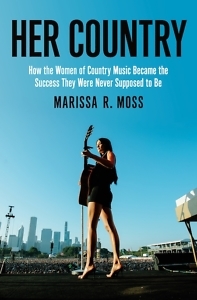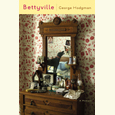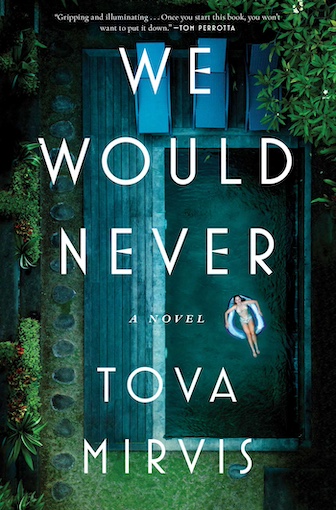Let’s Go, Girls
Her Country makes the case for a more inclusive country music industry
It’s been a long time since anyone would think it was OK to call Dolly Parton a “Country Barbie,” as a writer for The Guardian did about 20 years ago. But not enough has changed for women in country music since 2003, when The Chicks (formerly the Dixie Chicks) faced fierce backlash for saying they were ashamed that then-president George W. Bush was from Texas.

In Her Country: How the Women of Country Music Became the Success They Were Never Supposed to Be, Marissa R. Moss gets to the deep struggles women in country music have faced by focusing largely on the career trajectories of Kacey Musgraves, Mickey Guyton, and Maren Morris, all Texas natives. As Moss tells the story of these three women growing up and taking their individual paths to success, she moves from scenes like Musgraves performing at Nashville’s Bridgestone Arena to a full crowd of folks waiving pride flags to Musgraves as a kid, singing at George W. Bush’s inaugural ball, and she expertly fills in the gaps between. What did watching a powerhouse group of women like The Chicks fall from grace do to these young women and others like them growing up? What happens when the good ol’ boys club uses that fall from grace to continue to tell women to shut up and sing?
The amount of background and history Moss utilizes in the book is impressive, but it doesn’t read like some list of facts. Moss connects the dots, showing how 9/11 affected country music — how nationalism and the industry’s reaction to The Chicks’ antiwar stance made things more difficult for all women artists in the years after.
The story isn’t all heavy, though. About halfway into Her Country, the list of songs Moss starts to amass as she describes all the incredible country music from women makes one think there really ought to be a playlist in chronological order for every song in the book — and (spoiler alert) Moss delivers one. There’s a lot of joy sprinkled in the narrative. Everyone who loves music loves to know how and when songs are conceived, and we get plenty of that.
 The stories of support and female friendship within this orbit of songwriters are enough to make a reader cry like Garth Brooks in his Netflix special. For example, we learn how Morris spent one of her most successful weeks after the release of 2019’s Girl supporting her friends in The Highwomen rather than playing her own headlined events. We also get glimpses of Shania Twain, Reba McEntire, Trisha Yearwood, Margo Price, Tanya Tucker, and more. Moss knows how to throw in an obvious reference to a song without making it feel too forced or cheesy. Her turns of phrase — like calling Sturgill Simpson a shape-shifting “Kentucky David Bowie” — make the read a delight.
The stories of support and female friendship within this orbit of songwriters are enough to make a reader cry like Garth Brooks in his Netflix special. For example, we learn how Morris spent one of her most successful weeks after the release of 2019’s Girl supporting her friends in The Highwomen rather than playing her own headlined events. We also get glimpses of Shania Twain, Reba McEntire, Trisha Yearwood, Margo Price, Tanya Tucker, and more. Moss knows how to throw in an obvious reference to a song without making it feel too forced or cheesy. Her turns of phrase — like calling Sturgill Simpson a shape-shifting “Kentucky David Bowie” — make the read a delight.
But maybe most importantly, Her Country doesn’t shy away from the nitty gritty about who gets left out on Music Row and why. The passages where Moss turns to Guyton and how her experiences as a Black woman and songwriter differed from the experiences of white women like Musgraves and Morris are poignant.
In a chapter where Moss describes the formation, success, and importance of The Highwomen — a group made up of Morris, Brandi Carlile, Amanda Shires, and Natalie Hemby — it’s laid out in contrast to the way Guyton experienced that moment. She was first asked to be in the group’s video for “Redesigning Women,” a reimagining of feminist empowerment, and then disinvited after too many people received invitations and the band’s team worked to rescind a few. Guyton was hot on the charts at the time. Though not an intentional slight, it’s one of many moments that make it easy to see how progress in country music isn’t entirely linear.
As Moss points out throughout the book, the country music industry may treat white women poorly, but the struggles for Black women in country music are much worse. The book serves as an engaging reminder that there is still plenty of room to grow.
“If the last twenty years had been about making room for (mostly white) women, the next twenty years could be about making room for everyone else: Black women, queer people, Latinx artists, nonbinary, disabled, and indigenous musicians,” Moss writes. “Anyone who felt left out and wanted in: it was their country, too.”

Amanda Haggard is a freelance writer, editor, and journalist living in Nashville. For the past decade, she’s written about homelessness, books, music, politics, food, and everything in between. She is the co-editor of Nashville’s street newspaper The Contributor.


